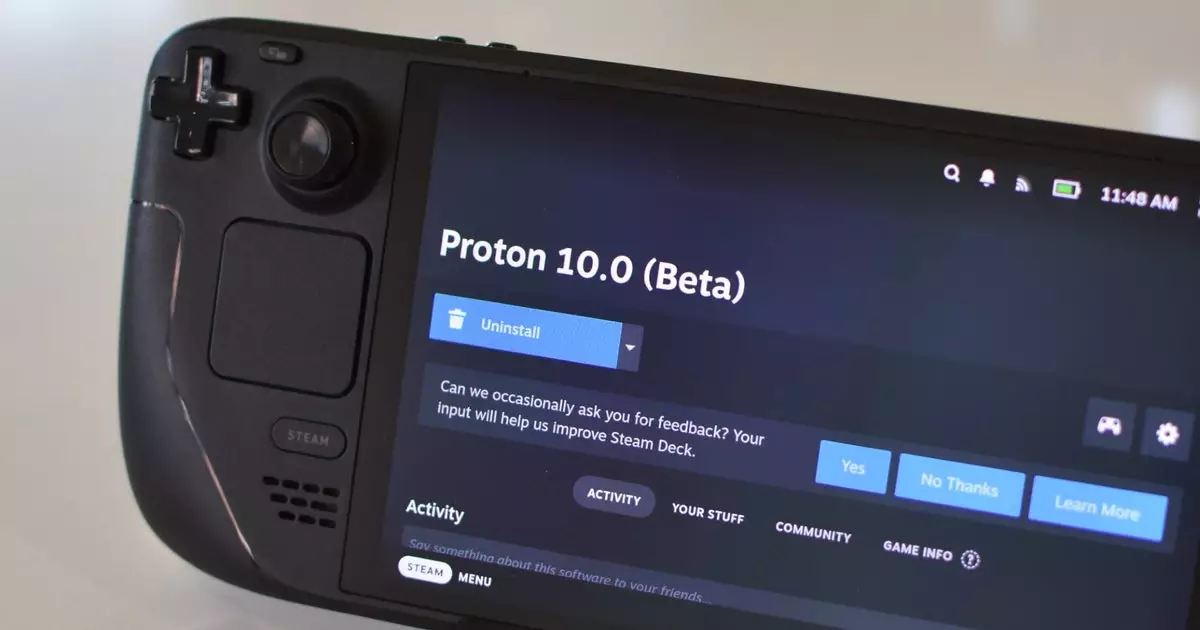The gaming landscape has undergone a seismic shift, particularly for Linux users, thanks to the relentless pursuit of compatibility and performance. The recent release of Proton 10.0 Beta, co-developed by Valve and CodeWeavers, marks a significant milestone in bridging the gap between Windows-exclusive titles and Linux systems. This update comes nearly a year after its predecessor and promises a wealth of compatibility fixes, making it a game-changer—quite literally—for enthusiasts looking to diversify their gaming experiences.
Broadening Compatibility Horizons
With Proton 10.0, users can finally enjoy a plethora of popular titles that were previously hindered by compatibility issues. Notably, games such as “Assassin’s Creed Shadows,” “Grand Theft Auto V Enhanced,” and “XCOM 2” receive significant enhancements, but that’s just the tip of the iceberg. The update extends its reach to previously unsupported titles like the much-talked-about “Microsoft Flight Simulator 2024” and “Batman: Arkham Asylum Game of the Year Edition.” These changes breathe new life into the Steam Deck and augment the gaming library available to Linux users, allowing them to explore new worlds without the barriers that once existed.
Furthermore, the update doesn’t just cater to the Steam Deck; it acknowledges the Linux desktop user base as well. Issues causing crashes in games like “Stalker 2” and “Marvel Rivals” on Intel GPUs have also been addressed. It’s exciting to witness such an upgrade, as it levels the playing field, making top-tier games more accessible to users who have long been sidelined by compatibility woes.
Rising Above the Competition
While Proton 10.0 positions itself as a robust solution for enhancing gaming on Linux, it’s essential to recognize that this is not the only contender in the market. Custom builds such as Proton GE have proven their merit in tweaking compatibility even further. However, one must appreciate the inherent advantages that Proton 10.0 Beta possesses. Its beta versions provide a more polished and stable experience compared to its unofficial counterparts, making the installation process streamlined and user-friendly. Users won’t have to navigate into the daunting Desktop Mode of the Steam Deck, an often intimidating experience for those less tech-savvy.
Additionally, the integration with the stable branch of SteamOS means users can test out the beta without fully committing to an unstable environment. In an era where immediate gratification reigns supreme, the ease of downloading Proton 10.0 Beta as if it were another game speaks volumes about Valve and CodeWeavers’ commitment to user experience.
Beta Testing and Community Engagement
Engaging with the community is a crucial aspect of any software’s evolution, and with Proton 10.0, this is particularly evident. Beta versions inspire passionate gamers to participate in the refinement process. By embracing the feedback of users who experience compatibility issues firsthand, the developers can fine-tune their approach. This constant loop of improvement fosters a sense of camaraderie and ensures that the final stable version of Proton 10.0 will be a well-oiled machine. It’s a collaboration that signals a maturation of Linux gaming and signifies that gamers on this platform truly have a stake in its development.
The significance of user engagement cannot be overstated. In an age where gaming feedback can pivot the direction of a project, Valve and CodeWeavers have tapped into the collective intelligence of the gaming community to ensure that the software not only responds to current needs but anticipates future challenges.
The Road Ahead: Beyond 10.0
While the arrival of Proton 10.0 Beta is certainly commendable, it’s crucial to glance beyond this update. What does the future hold for Linux gaming? As various titles continue to evolve and new challenges emerge, it’s apparent that Proton must remain adaptable to keep pace with rapidly changing technological landscapes. The commitment to improving the compatibility of a broader array of games will take center stage as players request support for even more titles.
Moreover, as developers shift their focus toward optimizing games for advanced technologies such as ray tracing and AI-driven graphics, the pressure will be on Proton to rise to these new challenges and sustain its reputation as the go-to solution for Linux gamers. The community’s anticipation for the stable release is palpable, but the journey beyond version 10.0 is where the true test lies in proving whether compatibility for Linux can not only keep up with but lead the charge in the ever-evolving world of gaming.


Leave a Reply